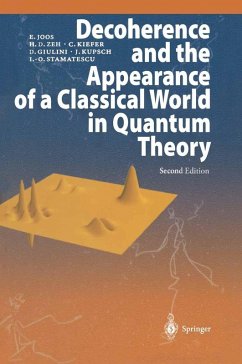This book describes the phenomena that arise from the interaction between quantum systems and their environment. Since the first edition appeared in 1996, the concepts of decoherence have become firmly established experimentally and are now widely used in the literature. Its major consequences are the emergence of "classicality", superselection rules, the border line between microscopic and macroscopic behavior, the emergence of classical spacetime, and the appearance of quantum jumps.
Most of the new developments in this rapidly evolving field are discussed in this second edition: chaos theory, quantum information, neuroscience, primordial fluctuations in cosmology, black holes and string theory, experimental tests, and interpretational issues. While the major part of the book is concerned with environmental decoherence derived from a universal Schrödinger equation, later chapters address complementary or competing approaches, such as consistent histories, open system dynamics, algebraic methods, and collapse models.
Most of the new developments in this rapidly evolving field are discussed in this second edition: chaos theory, quantum information, neuroscience, primordial fluctuations in cosmology, black holes and string theory, experimental tests, and interpretational issues. While the major part of the book is concerned with environmental decoherence derived from a universal Schrödinger equation, later chapters address complementary or competing approaches, such as consistent histories, open system dynamics, algebraic methods, and collapse models.
Dieser Download kann aus rechtlichen Gründen nur mit Rechnungsadresse in A, B, BG, CY, CZ, D, DK, EW, E, FIN, F, GR, HR, H, IRL, I, LT, L, LR, M, NL, PL, P, R, S, SLO, SK ausgeliefert werden.
From the reviews of the second edition: "This book is essential for anyone who is working in the quantum-classical divide." (Contemporary Physics 2005, 46, page 146) "The goal of this collective book is the understanding, in the framework of quantum mechanics, of the appearance of our macroscopic classical world ... . I strongly recommend it to all those interested in an understanding of quantum mechanics that goes beyond the pragmatic point of view summarized in the formula: 'for all practical purpose'." (Philippe Spindel, Physicalia Vol. 57 (2), 2005) "This book is essential for anyone who is working in the quantum-classical divide. Most of the material is written in a pedagogical style so that it can easily be used as an aid to start ones research in this field. The size of the reference list is impressive ... ." (J.Hartley, Contemporary Physics, Vol. 46 (2) 2005) "Since quantum mechanical interpretational issues are usually very sensitive matters, not to mention controversial, the authors are commended for putting together a coherent text ... . is highly recommended reading for anyone with a serious interest in basic problems in physics, notwithstanding being a senior scientist or an advanced graduate student. It constitutes an excellent portrayal of issues related to our fundamental conception of natural science. It also has much to offer to readers who already have experienced knowledge of physics." (Erkki J. Brändas, International Journal of Quantum Chemistry, Vol. 99, 2004)

